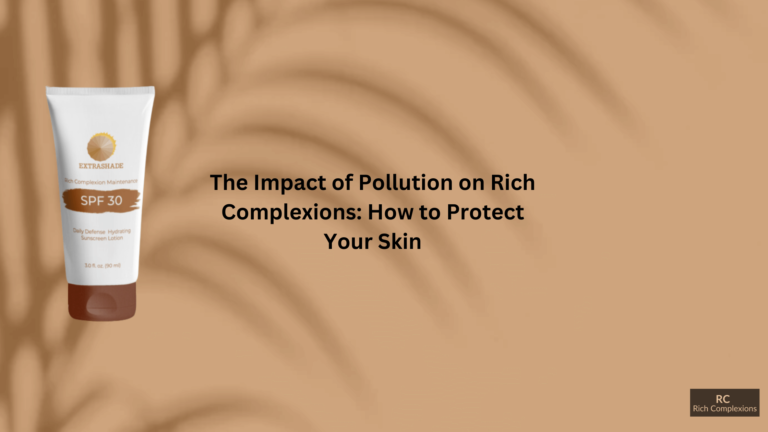Urban pollution isn’t just harming the environment — it’s quietly attacking your skin every day. For those with melanin-rich complexions, exposure to harmful pollutants can trigger hyperpigmentation, uneven tone, premature aging, and a dull, tired appearance.
The frustrating part? Most skincare advice overlooks the unique needs of deeper skin tones. Pollutants like dust, smoke, and harmful UV rays don’t just sit on your skin — they disrupt its natural barrier, leading to stubborn dark spots and long-term damage that’s tough to reverse.
But here’s the good news: with the right protection and targeted skincare habits, you can shield your skin, preserve your glow, and maintain your complexion’s natural resilience. In this guide, we’ll uncover how pollution affects melanin-rich skin and the smart, proactive ways you can defend your radiance daily.
The Impact of Pollution on Rich Complexions
Pollution poses significant challenges to all skin types, but its effects can be especially pronounced on rich, melanin-rich complexions. The presence of higher melanin levels provides some natural protection against UV radiation; however, rich complexions are more susceptible to certain forms of skin damage caused by pollution.
Oxidative stress and hyperpigmentation
Pollution, particularly from particulate matter like dust, soot, and car exhaust, generates free radicals that induce oxidative stress in the skin. This stress can lead to inflammation and damage the skin’s barrier function. For rich complexions, this often manifests as increased hyperpigmentation or dark spots, which can be more pronounced due to higher melanin content.
Dehydration and premature aging
Pollutants also strip the skin of its natural oils, leading to dehydration and a compromised skin barrier. This can result in an uneven skin tone, dryness, and a dull appearance. Over time, this exposure may accelerate premature aging, including the development of fine lines and wrinkles.
Exacerbation of skin conditions
Individuals with rich complexions are more prone to specific skin conditions, such as eczema, melasma, and post-inflammatory hyperpigmentation. Pollution can worsen these conditions by triggering inflammatory responses or increasing sensitivity, making it harder for the skin to recover from irritations or injuries.
How to Protect Your Skin
Protecting your skin from environmental stressors, such as UV radiation and pollution, is essential for maintaining a healthy and radiant complexion. Here are some key strategies to help you safeguard your skin:
1. Daily sunscreen use
Wearing sunscreen every day is one of the most effective ways to protect your skin. Opt for a broad-spectrum sunscreen like EXTRASHADE, which is designed to shield against both UVA and UVB rays. For those with rich complexions, it is crucial to choose a sunscreen that prevents hyperpigmentation without leaving a visible white cast.
2. Antioxidant-rich skincare
Incorporate products that are rich in antioxidants, such as vitamin C, vitamin E, and niacinamide. Antioxidants help neutralize free radicals caused by pollution and UV exposure, preventing oxidative stress and minimizing skin damage.
3. Hydration is key
Keeping your skin well-hydrated is crucial. Use a moisturizer that suits your skin type to maintain a healthy skin barrier and prevent dryness. Look for ingredients like hyaluronic acid, glycerin, and ceramides that attract and retain moisture in the skin.
4. Cleansing routine
Pollution particles and impurities can accumulate on the skin, leading to clogged pores and inflammation. A proper cleansing routine is essential to remove these pollutants. Use a gentle cleanser that removes dirt, oil, and makeup without stripping the skin of its natural moisture.
5. Protective clothing and accessories
Complement your skincare routine with protective clothing, such as wide-brimmed hats, sunglasses, and long sleeves. These physical barriers help shield your skin from direct sun exposure and pollution.
6. Healthy lifestyle choices
Adopting a healthy lifestyle also contributes to skin protection. A balanced diet rich in fruits, vegetables, and omega-3 fatty acids supports skin health from within. Staying hydrated and getting sufficient sleep helps your skin repair and regenerate, enhancing its natural defenses.
Conclusion
Rich complexions are uniquely vulnerable to the effects of pollution, such as hyperpigmentation, dehydration, and the exacerbation of certain skin conditions. Protecting your skin involves a combination of daily sunscreen use, particularly formulas like EXTRASHADE that cater to melanin-rich skin, and incorporating antioxidant-rich skincare products.
Maintaining a proper cleansing routine, staying hydrated, and adopting protective clothing and a healthy lifestyle are also crucial. These strategies collectively help defend against environmental damage, promote skin health, and maintain a vibrant complexion.


